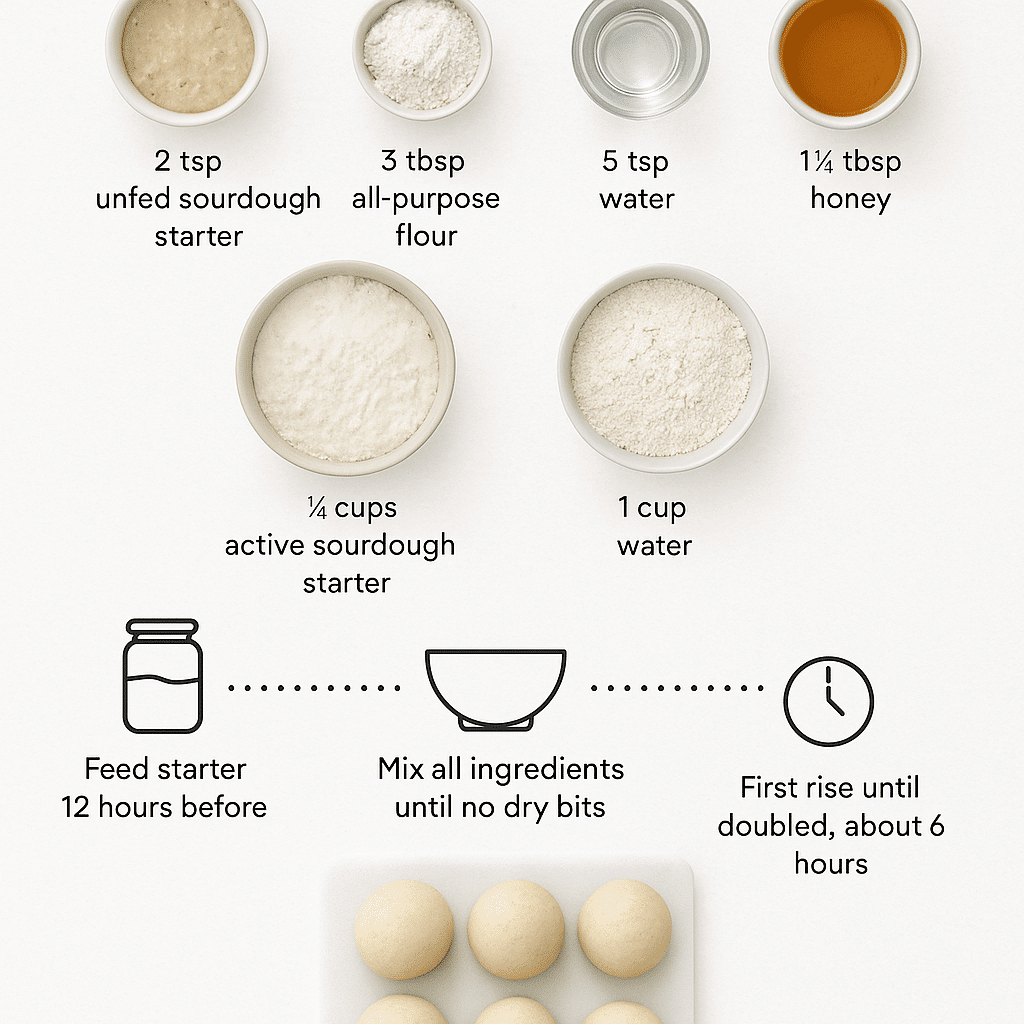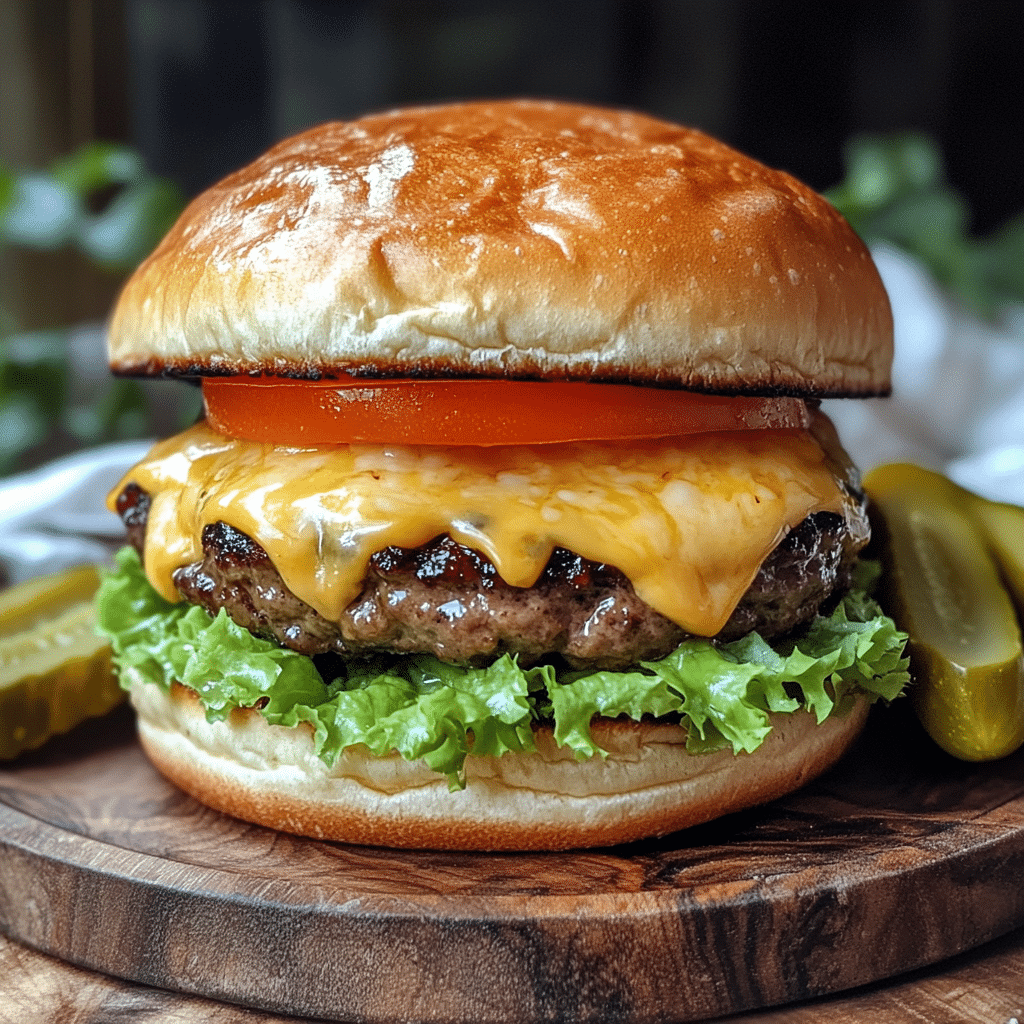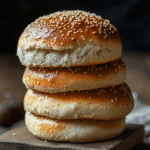Sourdough hamburger buns bring something special to your burger nights. They’re not just bread; they’re a promise of flavor, structure, and that soft yet hearty bite that makes every homemade burger feel like a celebration. Whether you’ve been baking sourdough for a while or you’re just curious if sourdough hamburger buns are worth it, this guide will show you how to make buns that hold up to juicy patties while delivering that signature tang. Let’s dive in and discover why these buns deserve a spot in your weekend grilling plans.
The Story & Why Sourdough Hamburger Buns Matter
My First Sourdough Hamburger Bun Victory
I still remember standing in my tiny kitchen, flipping burger patties while peeking at the oven, hoping my sourdough hamburger buns would rise and crackle just right. I had spent weeks learning to care for my starter, shaping loaves that sometimes fell flat, sometimes soared. But these buns felt different. They promised a soft crumb, a sturdy bottom, and that golden crust I longed for. When we bit into our burgers that night, with juice dripping and the bun holding strong, I felt a quiet triumph, the kind that only sourdough can teach. It reminded me of the simple pause sourdough invites, similar to the patient rhythm I found while making these mini sourdough loaves.
Why Sourdough Buns are Good for Burgers
So, are sourdough buns good for burgers? Absolutely. Unlike store-bought buns that collapse under a juicy burger, sourdough hamburger buns offer gentle chew and structure that hold fillings while adding depth of flavor. The natural fermentation adds a mild tang that complements everything from a classic cheeseburger to veggie patties. They also stay fresh longer, avoiding that stale texture that can ruin a burger’s joy. If you’re curious about nurturing your starter to support your baking, our ultimate guide to sourdough will give you the confidence to take your burger game higher with buns that are as satisfying as your favorite loaf.
How to Make Sourdough Hamburger Buns Soft Yet Structured

Ingredients and Hydration Tips
Making sourdough hamburger buns that stay soft yet structured starts with understanding your ingredients. A high-protein bread flour creates strength in the dough, helping the buns rise without collapsing under a burger’s weight. A hydration level of around 65–68% keeps the crumb soft while allowing the dough to remain easy to shape, ensuring you get that perfect rise in the oven. Don’t skip enriching the dough with a bit of butter or olive oil for added tenderness. If you’re unsure about your hydration or starter consistency, it’s worth checking out this Amish starter guide to learn how to build a resilient, active starter for buns that will rise beautifully.
A small amount of sugar or honey can also encourage browning, giving your buns a golden crust while maintaining a soft interior. Keep your salt balanced; it strengthens gluten while ensuring the flavor complements your burger without overpowering it. Sourdough hamburger buns thrive on the simple harmony of these ingredients, each playing a role in structure and softness.
Shaping and Proofing for Lightness
Shaping is where your sourdough hamburger buns truly get their identity. After your bulk fermentation, divide your dough into equal portions, using gentle tension while shaping each into a tight ball to encourage a rounded, puffy bun. Let them rest for a short bench proof before placing them on your baking sheet, allowing them to relax and expand.
Final proofing is key. The buns should be well-proofed but not over-proofed to maintain oven spring while preventing collapse. A gentle press should leave a slight indent that slowly springs back. If your kitchen is cool, you can extend the proof time, watching for signs of readiness rather than the clock. For a hands-on, cozy practice run, try these vegan sourdough banana bread techniques to get comfortable with fermentation’s rhythm before your next burger night.
Sourdough vs Brioche Buns for Burgers
Texture and Flavor Comparison
When comparing sourdough hamburger buns with brioche buns for burgers, it often comes down to texture and flavor. Brioche buns are known for their rich, buttery softness that practically melts in your mouth, while sourdough buns offer a mild tang with a structured, chewy crumb that holds up to juicy patties. If you love the plush pillow feel of brioche, it’s easy to see why it’s popular, but sourdough hamburger buns bring a new layer of flavor that balances fatty burgers beautifully.
Sourdough’s natural fermentation process develops a deep, complex taste that enhances your burger without overshadowing it. The slightly crisp crust gives way to a soft interior, providing a sturdy bite that brioche often lacks under heavier toppings. If you’re craving a burger bun that adds substance to each bite while maintaining softness, sourdough might surprise you. For example, the crumb structure in sourdough ciabatta offers an airy but strong base that mirrors what you aim for in your buns.
Which Is Healthier for Burgers?
If you’re asking, “What is the healthiest bun for burgers?”, sourdough often wins over brioche. Brioche buns typically contain large amounts of butter, eggs, and sugar, leading to higher calories and less nutritional density. In contrast, sourdough hamburger buns are naturally leavened, reducing the need for added sugars while making nutrients more accessible during digestion.
The fermentation process in sourdough can also help lower the glycemic index of the bread, making it a gentler option on your blood sugar while adding beneficial bacteria to your gut. If your goal is to keep your burgers both satisfying and health-conscious, sourdough buns pair seamlessly with lean proteins and fresh vegetables. If you’re exploring healthier baking options, the multigrain sourdough recipe on our site offers insight into combining whole grains with sourdough’s benefits, inspiring you to create buns that nourish without sacrificing flavor.
Troubleshooting Dense Sourdough Hamburger Buns
Why Are My Sourdough Buns Dense?
If your sourdough hamburger buns are turning out dense, don’t worry—you’re not alone. One of the most common reasons is under-proofing, where the dough hasn’t fermented long enough to build the gas needed for a light, airy crumb. A sluggish starter can also slow fermentation, leading to heavy buns that don’t rise well. Using flour with lower protein content can contribute to weak gluten structure, causing your buns to spread instead of rising.
Hydration levels matter too. A dough that is too dry will resist expansion, resulting in a tight, dense texture. Temperature also plays a big role; a cool kitchen can slow your proof, making it hard to know when your buns are ready to bake. If you’re unsure, practicing with sourdough bakes like these discard scones can help you learn to read your dough without the pressure of shaping buns.
How to Fix Dense Sourdough Buns
To achieve light, fluffy sourdough hamburger buns, start by ensuring your starter is active and bubbly before mixing your dough. Consider a float test or check that it has doubled within 4-6 hours of feeding. Use bread flour for stronger gluten development, allowing your buns to hold shape while staying tender. Adjust your hydration to keep the dough soft but manageable; a sticky dough often bakes into a softer bun.
During bulk fermentation, look for your dough to rise by about 50% and develop visible bubbles. When shaping, add tension to create structure while maintaining an even surface, which supports oven spring. Use the poke test during final proofing to check readiness: a gentle poke should leave a slow, partial spring back. If you’re interested in expanding your troubleshooting confidence, our guide on moldy sourdough starter will help you understand the health of your starter, ensuring your buns start strong.
FAQ
Are sourdough buns good for burgers?
Yes, sourdough hamburger buns are excellent for burgers. They offer a mild tang that pairs well with rich burger flavors, while their structure holds up to juicy patties and toppings without falling apart. The crumb is soft yet sturdy, ensuring every bite is satisfying. Plus, sourdough buns stay fresher longer, making them a dependable choice for your burger nights.
What is the difference between sourdough and brioche buns?
Sourdough hamburger buns use natural fermentation, giving them a mild tang and chewy texture, while brioche buns are enriched with butter, eggs, and sugar, creating a soft, tender crumb with a slightly sweet flavor. Sourdough buns hold up well to juicy burgers, while brioche offers a softer bite that can sometimes collapse under heavier fillings.
What is the healthiest bun for burgers?
If you’re looking for the healthiest bun for burgers, sourdough hamburger buns are a strong option. They are naturally leavened, reducing the need for added sugars, and fermentation can lower the glycemic index, making them gentler on blood sugar. Using whole grains in your sourdough buns can further increase fiber and nutrients while keeping your burgers delicious.
Why are my sourdough hamburger buns so dense?
Dense sourdough hamburger buns usually result from under-proofing, low hydration, or a weak starter. If your dough hasn’t fermented long enough, it won’t develop the gas needed for a light crumb. Using bread flour, adjusting hydration, and ensuring your starter is active can help. Shaping with tension and testing proof readiness also ensures your buns stay fluffy.

For More Sourdough Recipes Follow me on Pinterest
Conclusion
Sourdough hamburger buns can transform your burger nights from ordinary to memorable. They offer the structure your patties need, paired with the mild tang that only sourdough can provide. Whether you’re flipping classic cheeseburgers or layering veggie patties with avocado, these buns will hold up and add flavor to every bite. If you’ve been wondering whether sourdough is worth the effort, this is your sign to try it. Take your time, trust your starter, and let your next burger be built on a bun you baked with care.
| Ingredient | Purpose |
|---|---|
| Bread Flour | Provides structure for oven spring |
| Active Starter | Leavens and adds mild tang |
| Butter/Oil | Adds tenderness and softness |
| Water (65-68% hydration) | Balances crumb softness and structure |

Sourdough Hamburger Buns: Soft, Flavorful, and Easy to Master
- Total Time: 4-6 hours
- Yield: 8 buns
- Diet: Vegetarian
Description
Soft, structured sourdough hamburger buns perfect for juicy burgers, with a mild tang and sturdy crumb.
Ingredients
500g bread flour
100g active sourdough starter
300g water
10g salt
25g butter
15g sugar
1 egg for egg wash
Sesame seeds for topping
Instructions
1. Feed your starter until active and bubbly.
2. Mix flour, water, and starter until combined; let rest 30 min.
3. Add salt, sugar, and butter; knead until smooth.
4. Bulk ferment until 50% risen, about 3-5 hours.
5. Divide into 8 portions, shape into tight balls.
6. Proof on a tray until puffy, 1-2 hours.
7. Brush with egg wash, sprinkle sesame seeds.
8. Bake at 400°F (200°C) for 20-25 minutes.
Notes
Use bread flour for structure.
Adjust hydration if using whole wheat flour.
Allow buns to cool fully before slicing for burgers.
- Prep Time: 20 minutes
- Cook Time: 25 minutes
- Category: Breads
- Method: Baking
- Cuisine: American





